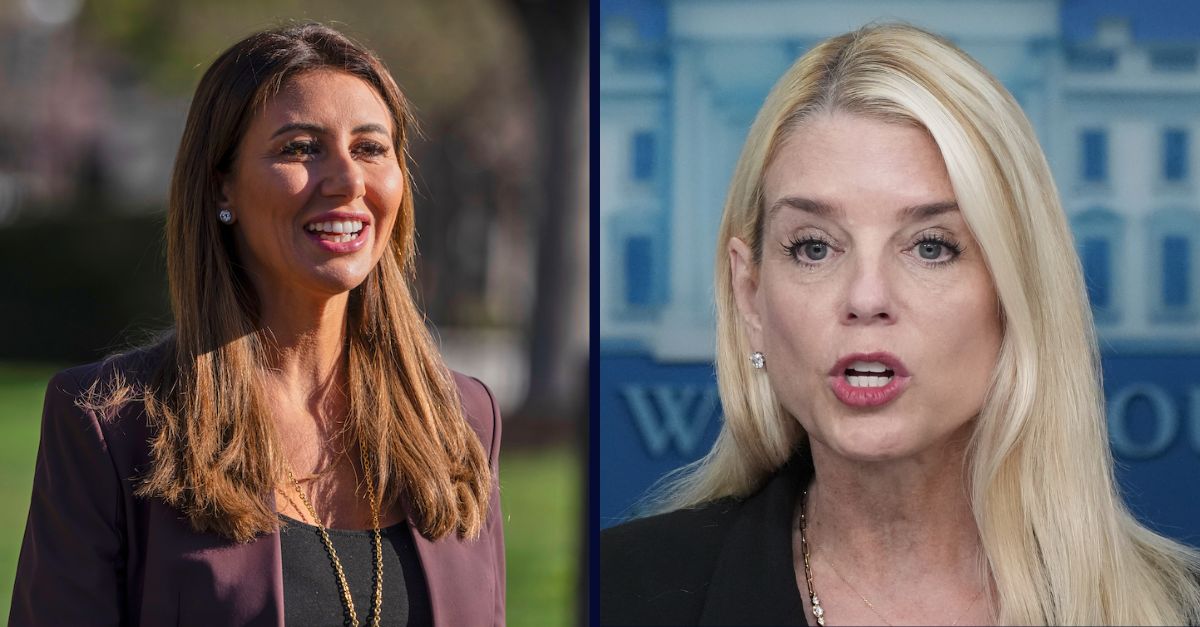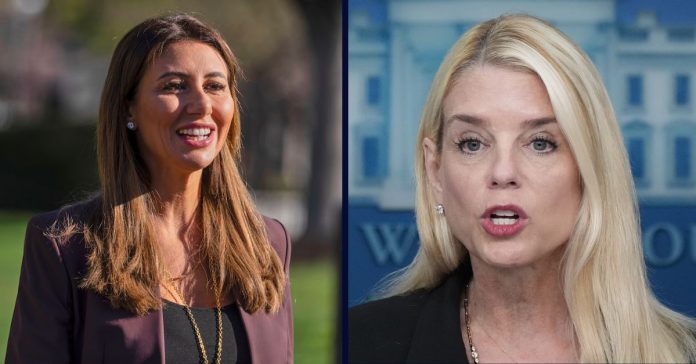
Left: Alina Habba, President Donald Trump”s pick to be the interim U.S. Attorney for New Jersey, arrives to speak with reporters outside the White House, March 26, 2025, in Washington (AP Photo/Mark Schiefelbein, File). Right: Attorney General Pam Bondi speaks during a news conference with President Donald Trump in the James Brady Press Briefing Room at the White House, Monday, Aug. 11, 2025, in Washington (AP Photo/Alex Brandon).
After a move that arguably watered down the U.S. Senate’s advice and consent role and rendered toothless a statute authorizing a federal court to appoint a top prosecutor, the DOJ on Tuesday boldly defended Alina Habba by asserting that she was essentially the acting U.S. Attorney for the District of New Jersey the moment she resigned from the same position — and even if one mechanism to make that happen was legally invalid, it doesn’t matter.
U.S. District Judge Matthew Brann previously called out the DOJ for putting the “cart before the horse” by submitting arguments that Habba was lawfully appointed, when he had instead ordered briefing from the government and criminal defendants Julien Giraud Jr. and Julien Giraud III under the assumption that she was unlawfully reappointed.
The Girauds had insisted that a drug-trafficking indictment should be thrown out based on the legally questionable authority of Habba to serve as N.J.’s top federal prosecutor. Brann said no such remedy was “available,” since it was not persuasive that an indictment first brought by a different U.S. attorney was “somehow retroactively taint[ed]” by Habba’s appointment, whether or not that was lawful.
Nonetheless, the judge wanted to hear more arguments on whether assistant U.S. attorneys under Habba’s command and supervision, or Habba herself, could be barred — and effectively forced to recuse herself — from taking further prosecutorial actions in the case, a line of argument that other criminal defendants in the Garden State are embracing.
U.S. Attorney General Pam Bondi has now submitted a supplemental brief contending that Habba effectively became acting U.S. attorney the moment she resigned from that job, instead of the individual a court “purported to appoint as her successor.”
Love true crime? Sign up for our newsletter, The Law&Crime Docket, to get the latest real-life crime stories delivered right to your inbox
“The Attorney General’s designation of Ms. Habba as First Assistant became effective immediately ‘upon’ Ms. Habba’s resignation as interim U.S. Attorney. And Ms. Habba’s resignation did not become effective until 5:00 p.m. on July 24, 2025,” the DOJ filing said. “Thus, she was the First Assistant the moment the vacancy arose, which happened before the District Court could exercise its authority under § 546(d) to appoint someone else on July 26.”
Recall that in order to keep Habba as acting U.S. attorney, President Donald Trump pulled her nomination. As DOJ tells it, Habba resigned before her 120-day acting stint technically expired and before her first assistant Desiree Leigh Grace’s appointment by court as U.S. attorney became effective — but even if Grace was effectively appointed by the district court, Trump’s firing of her on July 26 under “clear statutory authority” cleared the way for Habba and confirmed the court appointment was “ineffective.”
With Grace out of the picture and the first assistant position she served vacant as of July 22, Habba was reinstalled to her ousted subordinate’s position under the Federal Vacancies Reform Act on July 24, making her, in effect, the top prosecutor in the office again. At the same time, just in case anyone questioned that legal authority, Habba was named a “Special Attorney to the United States Attorney General” under a federal statute governing the commission of special attorneys, giving her the power to act as a U.S. attorney through another means as the office’s supervisor.
The DOJ’s overall response to the Girauds’ concerns? Heads I win, tails you lose.
“In sum, the statutes that Congress has enacted permit the Attorney General to do what she has done here: appoint Ms. Habba as Special Attorney, designate her as FAUSA [first assistant], and delegate to her the authority to conduct and supervise litigation in the District of New Jersey. There is nothing exceptional about that,” the filing said. “Accordingly, Ms. Habba can continue exercising those functions regardless of whether she is also properly serving as Acting U.S. Attorney.”
In other words, if Grace’s appointment by the court was ineffective, Habba effectively began serving as interim U.S. attorney immediately upon her own resignation on July 24; if Grace’s appointment technically was effective, Trump’s firing of her means she at best served in that role for two days before Habba resumed control on July 26.
“So the Girauds’ fixation on the status of Ms. Habba’s interim appointment as U.S. Attorney is beside the point. Even were they correct—which, to be clear, they are not—that either Ms. Habba was not properly appointed as interim U.S. Attorney or that her appointment expired earlier than the Government maintains, that would at most mean that the individual whom the District Court appointed as interim U.S. Attorney served in that role for a brief period before the President removed her,” the DOJ said. “Ms. Habba, therefore, as First Assistant, became the Acting U.S. Attorney under the FVRA, at the latest, when the President removed the court-appointed interim U.S. Attorney.”

